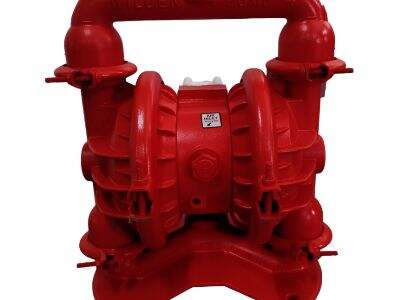Diaphragm pumps are required in sewage treatment to transport fluids and solids from one area to next. They are extremely important in ensuring in everything goes well. Occasionally diaphragm pumps can become clogged, and no longer do their job. Preventing clogs and keeping the pumps running smoothly is essential. Let’s learn how to do that.
Reasons for Clogging in Diaphragm Pumps
Diaphragm Pump Clogging Clogging in a diaphragm pump can occur due to several reasons. Other times, solid pieces or other debris in the pump can clog the water flow. Other times, the pump just might not do well because it’s old or broken. “It’s important to be looking at that pump all the time and say, ‘Oh, my gosh, it’s clean, it looks good,’ and make sure it’s all good.” Understanding the reasons why clogs occur can help us take preventive measures to prevent them.
Diaphragm Pump Maintenance:
What To Keep An Eye On Keep you equipment moving for longer with Diaphragm Pump Maintenance Tips Spare time for the substantial things To keep your equipment running as smooth as a deep creek, doing a periodic maintenance check on your diaphragm pumps can be extremely important in order to save time and money in the long term.
If we are to prevent clogs and ensure the pumps keep functioning, we have to do maintenance regularly.” This includes inspecting the pump for damage or wear, cleaning it regularly, and replacing nonfunctioning parts. With routine maintenance, we can help prevent clogs and help everything run ‘smoothly.’
Selecting the Best Pump for Wastewater
The selection of the right pneumatic diaphragm pump in wastewater treatment matters When deciding exactly which air operated diaphragm pump you should use in wastewater treatment, there are some factors that need to be considered. Different types of pumps exist for different types of jobs, and what we need to do is select the one that best suits our need. With the right pump we can avoid clogs and insure it will work effectively.
Preventing Clogs with Filtration Systems
Another way to prevent clogs in diaphragm pumps is to employ adequate filtration. Filtration systems also are designed to eliminate solids, debris from the water before arrival at the pump. This may lower the risk of blockages. We just need to keep the pump clean, with proper filtration systems.
Operators Are Trained to Use Best Practices
A second important method for preventing blockages and problems when using diaphragm pumps is ensuring that operators are educated in the best practices for operating them. We can reduce the risk of clogs and help ensure the pumps work well by teaching operators how to use them the right way.” Training operators is key to maintaining all of this in order.

 EN
EN
 AR
AR
 HR
HR
 CS
CS
 DA
DA
 NL
NL
 FI
FI
 DE
DE
 EL
EL
 HI
HI
 IT
IT
 KO
KO
 PL
PL
 PT
PT
 RO
RO
 RU
RU
 ES
ES
 SV
SV
 TL
TL
 ID
ID
 SR
SR
 UK
UK
 VI
VI
 HU
HU
 TH
TH
 TR
TR
 AF
AF
 MS
MS
 GA
GA
 HY
HY
 AZ
AZ
 KA
KA
 BN
BN
 LA
LA
 MN
MN
 NE
NE
 KK
KK
 UZ
UZ
 KY
KY
 MY
MY






